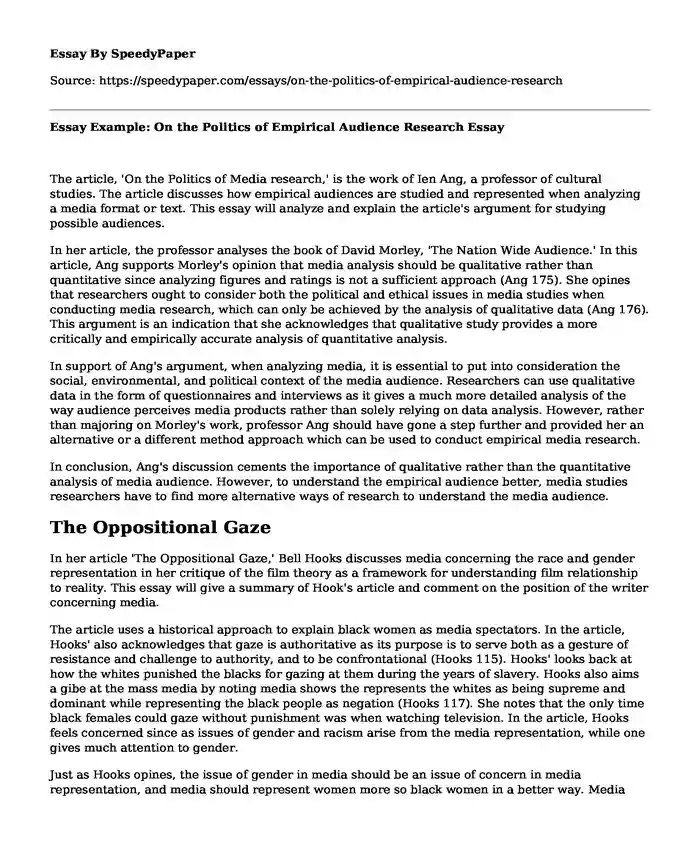
| Type of paper: | Essay |
| Categories: | Media Social psychology Case study Community |
| Pages: | 3 |
| Wordcount: | 672 words |
The article, 'On the Politics of Media research,' is the work of Ien Ang, a professor of cultural studies. The article discusses how empirical audiences are studied and represented when analyzing a media format or text. This essay will analyze and explain the article's argument for studying possible audiences.
In her article, the professor analyses the book of David Morley, 'The Nation Wide Audience.' In this article, Ang supports Morley's opinion that media analysis should be qualitative rather than quantitative since analyzing figures and ratings is not a sufficient approach (Ang 175). She opines that researchers ought to consider both the political and ethical issues in media studies when conducting media research, which can only be achieved by the analysis of qualitative data (Ang 176). This argument is an indication that she acknowledges that qualitative study provides a more critically and empirically accurate analysis of quantitative analysis.
In support of Ang's argument, when analyzing media, it is essential to put into consideration the social, environmental, and political context of the media audience. Researchers can use qualitative data in the form of questionnaires and interviews as it gives a much more detailed analysis of the way audience perceives media products rather than solely relying on data analysis. However, rather than majoring on Morley's work, professor Ang should have gone a step further and provided her an alternative or a different method approach which can be used to conduct empirical media research.
In conclusion, Ang's discussion cements the importance of qualitative rather than the quantitative analysis of media audience. However, to understand the empirical audience better, media studies researchers have to find more alternative ways of research to understand the media audience.
The Oppositional Gaze
In her article 'The Oppositional Gaze,' Bell Hooks discusses media concerning the race and gender representation in her critique of the film theory as a framework for understanding film relationship to reality. This essay will give a summary of Hook's article and comment on the position of the writer concerning media.
The article uses a historical approach to explain black women as media spectators. In the article, Hooks' also acknowledges that gaze is authoritative as its purpose is to serve both as a gesture of resistance and challenge to authority, and to be confrontational (Hooks 115). Hooks' looks back at how the whites punished the blacks for gazing at them during the years of slavery. Hooks also aims a gibe at the mass media by noting media shows the represents the whites as being supreme and dominant while representing the black people as negation (Hooks 117). She notes that the only time black females could gaze without punishment was when watching television. In the article, Hooks feels concerned since as issues of gender and racism arise from the media representation, while one gives much attention to gender.
Just as Hooks opines, the issue of gender in media should be an issue of concern in media representation, and media should represent women more so black women in a better way. Media should not depict women as objects of the male gaze and enjoyment or reduce women to mere spectators. Media should portray women as equals to their male counterparts as opined by Hooks in her article, which gives a positive critique of the mass media.
In conclusion, from the article, it is clear that mass media has reduced black women to spectators rather than giving them a representation which can boost their confidence and consciousness. Media should seek to improve the confidence of black females through better representation in the media. One way can be by giving the roles similar to the males in the films.
Works Cited
Hooks, Bell. "The Oppositional Gaze: Black Female Spectators." In Black Looks: Race and Representation. Boston South End Press. (2003): Pg. 115-131. Accessed on August 4, 2019. Available at http://criticaltheoryindex.org/assets/hooks%2C-bell_the-oppositional-gaze-black-female-spectators.pdf
Ang, Ien. "On the politics of empirical audience research." Media and cultural studies (2001). Pg. 174 - 195. Accessed on August 4, 2019. Available at https://www.academia.edu/3001648/On_the_politics_of_empirical_audience_research
Cite this page
Essay Example: On the Politics of Empirical Audience Research. (2023, Jan 31). Retrieved from https://speedypaper.net/essays/on-the-politics-of-empirical-audience-research
Request Removal
If you are the original author of this essay and no longer wish to have it published on the SpeedyPaper website, please click below to request its removal:
- Sociological Research Paper Examples for Free
- Free Essay on the Shakespeare's View of Basic Human Nature in King Lear
- Free Essay with CEMEX Research and Recommended Strategies
- Essay Sample on Ergogenic Aids - Creatine Supplement
- Read about Colonization and the Effects on Modern Day Africa in This Free Essay
- Innovation Trends in Sporting Events, Free Essay Example
- Free Essay on Hypertension and Diabetes on the African American, Caucasian and Latino People
Popular categories




